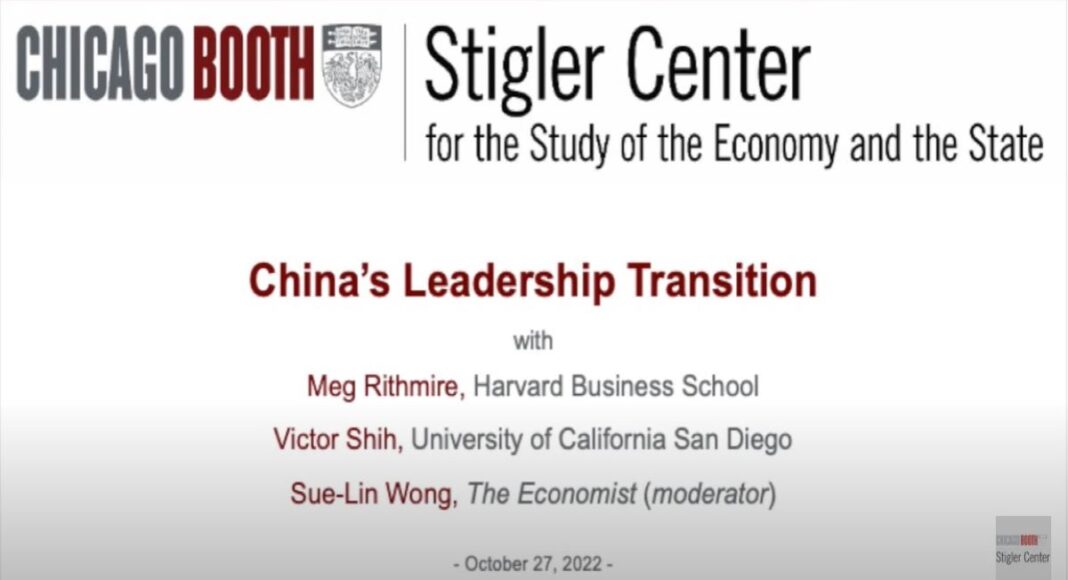On Oct. 22, Chinese President Xi Jinping solidified power and an unprecedented third term with the conclusion of the Chinese Communist Party’s 20th National Congress. Five days later, the Stigler Center, home to ProMarket, hosted a panel of experts to discuss these developments and their implications for China and the global economy.
On Oct. 27, Professors Meg Rithmire of Harvard Business School and Victor Shih of the University of California San Diego discussed Chinese President Xi Jinping’s consolidation of power during the Chinese Communist Party’s 20th National Congress in October and what it means for China’s economy. The panel, moderated by The Economist’s China correspondent, Sue-Lin Wong, wrapped up a series of webinars the Stigler Center has hosted this year exploring different aspects of China’s political economy, including discussions about increasing regulatory activity in several sectors, a renewed emphasis on “common prosperity,” and the government’s zero-Covid strategy.
Shih began the discussion remarking that Xi’s consolidation of power meant it would be very unlikely that the government corrects any of its previous policies, such as zero-Covid, especially those Xi instituted. “Everyone in the Politburo Standing Committee, today, got there only because of Xi Jinping’s promotion of them.” Instead, Shih added, the consolidation of power may lead to political uncertainty in the medium term as Xi has pushed out plausible successors to his rule. This may lead to intense jockeying among younger officials. Shih thought the changes in China’s political sphere would translate into an increased focus on welfare policy and regulatory adjustments regarding wealth, rather than, perhaps, any self-reflection on the state’s aggressive role in its economy.
“It really is quite clear that we are in an era of political imperatives being much more important than growth,” Rithmire agreed. National security has clearly taken the baton from economic output as a priority. The old model, state capitalism, had a relaxed approach towards the private sector as it generated growth, and state control was reserved for large, strategically-oriented firms. Now, there is a new model, party-state capitalism, which emphasizes the party’s role as the most important consideration. This shift has not been sudden, Rithmire added. Rather, it has been a gradual response to both domestic and global threats to the party’s interests.
After the 2007 financial crisis, the Chinese state started to invest in its economy and took minority stakes in many firms within strategic sectors, Rithmire said. China’s government feared that dependence on foreign supply chains, especially for high-tech products, would lead to rival countries weaponizing them. The government created new laws to enhance national security, such as commandeering the assets of firms to assist with national security issues. Ironically, these tactics only exacerbated international tensions. “The fact that they exist, and the fact that the Chinese state can be found in the corporate structure of these firms, has really alarmed foreign governments, especially the United States and OECD countries…,” said Rithmire. “In trying to overcome this reliance on foreign supply chains, they’ve scared their partners in ways that have shut them out of foreign supply chains and indeed provoked the West” into weaponizing these supply chains.
In an effort to make itself safer, China instead made itself less safe. Rithmire also thinks the party-state capitalism model is unlikely to generate growth due to structural problems such as high levels of debt, misallocation of resources, and China’s population dynamics, in addition to the Chinese Communist Party’s mistrust of big business.
However, this does not mean that China’s economy will crash. “We expect explosive and contagious dynamics within the Chinese economy. We never get them. What we always get is a slow burn, a slow unwinding of things that’s taking misallocated resources and misallocating them in a different direction,” Rithmire said. We likely will not see a crash because the government has significant control over input factor prices and minority shares in many listed firms, she added. However, concerns do exist because of extremely low growth, households saving more because they are concerned about the future, businesses refusing to invest, and debt issues among corporations and local governments that seem insurmountable. Shih agreed, adding that most everything is under control, but there are some weak points. Causes for concern include the foreign exchange rate and strained local budgets because local governments are not receiving enough funding from the central government.
Two other topics arose during the panel. In the first, Wong regretted the limited role of women in the Chinese Communist Party. “It’s always been appalling how few women are on the politburo, but for the first time in a quarter century to not have a single woman is sending a real message.” Shih added that women do not get to hold important positions at any level of government, which is problematic because it is by holding sensitive positions at the lower levels that leads to promotion to higher levels of government. Rithmire added that women are employed at the highest levels of the private sector within China, particularly financial firms, and that there is a real mismatch in China between women holding powerful positions in the private sector and the opposite occurring in the public sector.
In the second topic, which concluded the panel, Wong asked the panelists about the prospects of China invading Taiwan. Shih said that there is no rational reason for China to invade Taiwan. Xi does not need to invade Taiwan to bolster his political standing, as opposed to other leaders who will drive their countries to war to improve domestic approval. There are also significant economic downsides to invasion. However, Shih said, China’s idea of rejuvenation and global primacy is tied to its reunification with Taiwan. Ultimately, the decision to invade Taiwan will come down to Xi’s personal preference. Rithmire added that if political leadership is insulated from disagreement, poor decisions will be made. She said she is less worried about short-term bellicosity than the long-term prospects of an invasion.






